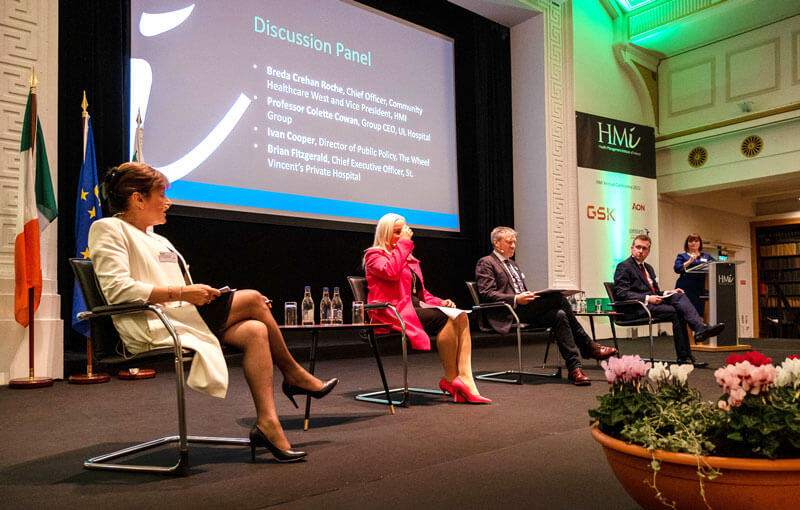
The importance of all health services working together was stressed at a panel discussion during the Conference.
Prof. Colette Cowan, Group CEO UL Hospital Group acknowledged the work of staff during the Covid-19 pandemic saying it was a time of collaboration and considerable innovation. For example, in the Mid-West there was the development of the Limerick Digital Cancer Research Centre (a multidisciplinary Digital Cancer Centre dedicated to improving our understanding of the fundamental biology of cancer) and using this new knowledge to find better ways to prevent, diagnose and treat the disease. Also the development of a Masters in AI. University Hospital Limerick had also continued to develop its strong Robotic Assisted Surgery Programme across three specialities.
“While we have a strategic vision, much of which has been implemented, we have a fatigued workforce due to being operationally overwhelmed. We work closely with our CHO Colleagues to keep patients safe and a positive development is the Enhanced Community Care Programme. That is the future of healthcare. Both sides are stronger when we work together.
Mr. Ivan Cooper, Director of Public Policy with The Wheel said that in the context of the Health Dialogue Forum he was now more optimistic for the future. The Forum is looking at how to improve the relationship between the HSE and the hundreds of voluntary and community organisations it funds. There were questions around partnership and huge questions around pay parity and recruitment that needed to be dealt with. Fear of making mistakes could also lead to the elimination of innovation in services. People should not be shamed for making mistakes, but rather mistakes should be seen as opportunities for learning.
Ms. Breda Crehan-Roche, Chief Officer, Community Healthcare West and Vice-President of the HMI acknowledged all staff for their sterling work over the past two and a half years during COVID19 and noted that this had forced all services to work together in collaborative partnerships and created synergies. In the West, the community and acute services worked together, worked closely with Sections 38 and 39 funded organisations, voluntary groups, An Garda Siochana, Local Authorities, Defence Forces and Naval Services etc. This created trust and strengthened partnerships.
Ms. Crehan-Roche was asked what the future of healthcare looked like? “Now that the barriers have been knocked down, partnerships strengthened, we need to continue to work conjointly and across many partners in the west. Our staff are one of our greatest assets and we need investment in staff, staff recruitment and retention.
“We have many examples of very positive collaborative partnerships and working, some examples such as Enhanced Community Care, ICPOP, Chronic Disease, we need to build on those and roll out Sláintecare including RHAs.”
Ms Crehan-Roche referred to one such recent example; Sláintecare Healthy Communities programme launched during October. This Healthy Communities area in North West Mayo involved working in partnership with Mayo County Council, Mayo North East, the Family Life Centre, Foroige and other key partnership organisations. It would deliver evidence based, quality health programmes to provide people living in this community with opportunities and supports to improve their overall health and wellbeing.

